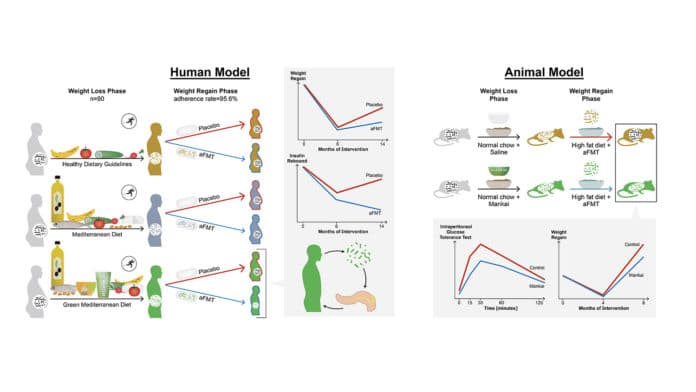Weight regain and rebound of cardiometabolic risk factors following initial rapid weight-loss has long been a significant challenge of durable dieting. This phenomenon was often observed in long-term weight loss trials.
In a new groundbreaking study, scientists from Ben-Gurion University collaborated with Tel-Aviv University, and a group of international experts from U.S. and European research institutes explored whether preserving the optimized personal microbiome from fecal transplants after six months helps maintain weight loss.
In an unprecedented 14-month clinical trial, abdominally obese or dyslipidemic (high cholesterol) participants in Israel were randomly assigned to one of three groups: healthy dietary guidelines, a Mediterranean diet, and a green-Mediterranean diet.
After 6-months during the weight loss phase, 90 qualified members provided a fecal sample that was prepared into autologous fecal microbiota transplantation (aFMT) by frozen, opaque, and odorless capsules. The members were then arbitrarily allotted to two groups with 100 capsules containing their fecal microbiota or a placebo, which they ingested until month 14.
In the green-Mediterranean diet group, participants were provided with Mankai, a specific duckweed aquatic strain in a green shake, green tea, and 28g. of walnuts. This was the only group diet strategy that induced a significant change in the gut microbiome composition during the weight loss phase.
The 90 participants lost 8.3 kg (18.2 lbs.) on average after six months. However, only in the green-Mediterranean diet group did aFMT limit weight regain to 17.1%, versus 50% for the placebo.
BGU Ph.D. student Dr. Ehud Rinott said, “The green-Mediterranean diet also resulted in the preservation of weight loss-associated specific bacteria and microbial metabolic pathways, mainly glucose transport, following the microbiome intervention, compared to the control.”
This is the first study that shows the preservation of an “ideal” gut microbial composition can be utilized at a later point to accomplish metabolic advantages. Using the patient’s stool after optimization is a novel concept that overcomes many of these barriers.
Dr. Ilan Youngster at Tel-Aviv University said, “I believe that the use of autologous fecal microbiota transplantation will be applicable in the future for other indications as well.”
Also, a green plant-based eating regimen, such as Mankai, better improves the microbiome for the microbiota transplantation system. This conceivably enhances the conditions for the aFMT, gathered during the maximal weight-loss stage.
In a complementary Mankai-specific mouse model experiment directed by Prof. Omry Koren at Bar-Ilan University, the analysts had the option to imitate the impacts of aFMT on regaining and insulin sensitivity and isolate explicitly how Mankai instigates these impacts. The Mankai duckweed aquatic plant is being grown in Israel. Different nations in a closed environment and is profoundly ecologically maintainable – requiring a small amount of the water to create every gram of protein contrasted with soy, kale, or spinach.
Prof. Koren said, “The nutrition-microbiome axis has been proven in this study, as high polyphenols diet, and specifically, Mankai, a protein-based plant, and dietary fibers could ideally optimize the microbiome in the weight loss phase. It induces the potent microbiome to recall the flora of germs related to regaining attenuation and improved glycemic state after transplantation.”
BGU Prof. Iris Shai said, “These findings might be a good application of personalized medicine. Freezing a personal microbiome bank could be an effective way to maintain a healthy weight while dieting since the rapid weight loss phase is accompanied by optimal cardiometabolic health. By optimizing the composition and function of the gut microbiome within the host, we have a novel approach for metabolic-memory preservation.”
Journal Reference:
- Rinott E et al. Effects of Diet-Modulated Autologous Fecal Microbiota Transplantation on Weight Regain, Gastroenterology (2020), DOI: 10.1053/j.gastro.2020.08.041
